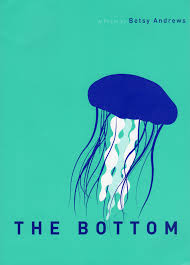|

The Bottom
Betsy Andrews
42 Miles Press
2014
55 pages
I am not trying to ruin your experience of reading Betsy Andrews’s book-length poem, The Bottom, but I want you to know that this is the final line of the poem and book: “find us.” The period is mine. While Andrews uses punctuation throughout this poem, the period especially is largely ignored because of the constant communication between each image, line, and call for help throughout this triumphant piece. The final line, then, is imperative in more than one way.
This poem begins by Andrews’s speaker considering the ghost-ness of everything—“ghost of the barnacled schoolroom,” for example—and moving outward to the sea while commenting on our overwhelmingly consumerist culture. On the same page, “a jellyfish hitches a ride on a gallon jug called Tide” and “the rivers named Crocodile and Snake be damned for the license to Have It Your Way.” Andrews later points out the danger of our almost complete inactivity: “another protest for the plight of the penguins mounted by hitting ‘send.’” The poem repeatedly focuses on animals and our cultural ambition in this way, and the richness of Andrews’s work is overwhelming: “’Money ain’t worth everything,’ / says the man in the house by the coal ash pond on Needmore Avenue; / Alexandria’s residents knew they were sinking, but the open-billed stork? not a clue; / astronauts washed up, gasping for air on the antique beaches of Mars.” I am amazed by this depth, and Andrews never relents.
This moment in the second half of the poem takes my breath away: “if the murk and the crush and the rush of fear for the bite at our backs disarms us, love, / let us make like jewel squid at 5,000 feet, / one eye trained on the darkness, and the other bulging toward light.” Appropriately, these three lines end the page in response to the speaker’s list of shipwrecks. Andrews’s speaker responds to the fear inspired by these tragedies with the idea that the speaker, the speaker’s lover, and the reader must push onward. This is what poetry does best. I am grateful to Andrews for reminding me.
You simply have to read this book to grasp the development of this piece. On a single page, for example, the narrative progresses from the numbness of human traffic along a beach to a horse named Patches to Donald Trump to the speaker’s dying and hallucinating grandmother, all working together to create affecting social commentary. Andrews’s expertly handled repetition and use of lists make this a book to remember, but the depth of this poem is seriously awe-inspiring. Everything about this book—the setting, the subject matter, the speaker, the human, animal, and natural characters, the title itself—pulls the reader down, down into Andrews’s insistence that we must be both cognizant and invigorated by the need to understand what we are doing to the world around us. I have read and reread the final lines:
The face—if it’s face—turns to the observable; a purl of blue,
a dusky scratch, a naked singularity cast in a font 10 million years gone;
still, the unmistakable signature of the presence of absence;
past the moon named Egg and the moon named Eggshell,
a crack in the well of the night, hydromantic and, perhaps,
just bright enough for you to find us
humble telescope,
find us
This ending is a turning point because Andrews’s speaker finally looks outward for answers and help. Previously on this last page, the speaker wonders whether “they” will see our world in environmental ruin, and the speaker here goes further in hoping what little might be left will be noticeable to someone or something else. After all the fear and truth Andrews reveals about our world, she wants there to be hope left for us to find ourselves and to believe in the possibility of eventually being found.
--Sarah Dravec
Sarah Dravec is a graduate student in the NEOMFA in Akron, Ohio, where she studies poetry. She is a poetry editor for Barn Owl Review. Her work has appeared or is forthcoming in And/Or, Blast Furnace, Bone Bouquet, Dressing Room Poetry Journal, *82 Review, and others.
Also by Sarah Dravec:
Review of Any Anxious Body by Chrissy Kolaya
Review of My Funeral Gondola by Fiona Sze-Lorrain
Review of The Forever Notes by Ethel Rackin
Review of Glass Armonica by Rebecca Dunham
Review of Vivarium by
Natasha Sajé
Review of Phrasebook for the Pleiades by Lorraine Doran
|
|

